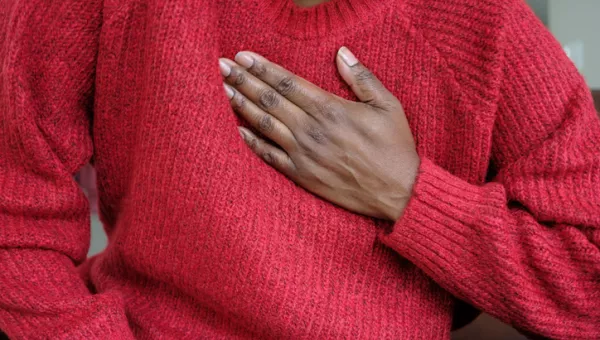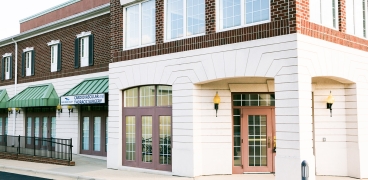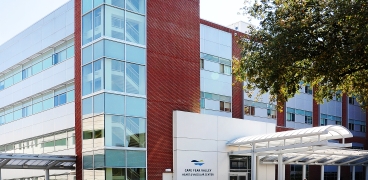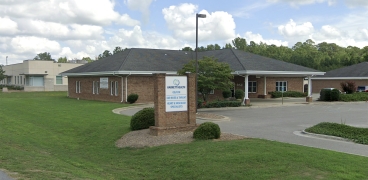Welcome to our Heart & Vascular Center, a leader in treating heart attacks with state-of-the-art care and dedicated expertise. Learn how we combat heart attacks, using advanced treatments and personalized care to protect and improve your heart health.
What is a Heart Attack?
A heart attack, medically known as a myocardial infarction, occurs when blood flow to the heart is severely reduced or blocked. This blockage is often due to a buildup of fatty substances, cholesterol and other materials forming plaques in the coronary arteries. The process is called atherosclerosis.
When a plaque ruptures, it can create a clot, blocking the artery and disrupting blood flow. This lack of blood flow can damage or destroy part of the heart muscle.
Heart attacks can result from complete or partial blockage of coronary arteries. A total blockage leads to an ST elevation myocardial infarction (STEMI). A partial blockage causes a non-ST elevation myocardial infarction (NSTEMI). Sometimes, non-ST elevation myocardial infarction can involve a total blockage.
Other less common causes include:
- Coronary artery spasm, where the artery severely constricts without a blockage
- Spontaneous coronary artery dissection (SCAD), a tear in the heart artery
Factors such as coronary artery disease, high cholesterol and lifestyle choices such as smoking can elevate the risk. Symptoms can vary, ranging from intense chest pain to subtle discomfort, and can include shortness of breath, fatigue and nausea.
Immediate medical attention is crucial to minimize damage to the heart muscle.
Heart Attack Signs and Symptoms
Common signs and symptoms of a heart attack include:
- Chest pain or discomfort, often feeling like pressure, squeezing or aching
- Pain spreading to the shoulder, arm, back, neck, jaw or upper belly
- Shortness of breath
- Cold sweat
- Fatigue
- Nausea
- Lightheadedness or sudden dizziness
- Heartburn or indigestion-like sensations
Women may have atypical symptoms such as brief pain in the neck, arm or back. Heartburn or indigestion-like sensations can also occur.
When to Seek Care for a Heart Attack
Seek immediate medical help if you experience chest pain, shortness of breath or any unusual symptoms that persist or worsen.
Don't wait; call 911 or go to the Emergency Department, especially if symptoms are severe or don't improve.
Early intervention is critical for heart attacks.
Heart Attack Diagnosis at Cape Fear Valley Health
At Cape Fear Valley Heart & Vascular Center, a possible heart attack is taken very seriously.
We have state-of-the-art equipment and accredited expertise, making us one of only 25 chest pain centers in North Carolina. Our facility is also part of the 100+ hospital RACE (Reperfusion of Acute Myocardial Infarction in North Carolina Emergency Departments) program. This statewide project is a collaborative effort to increase the rate and speed of heart attack care.
Upon arrival, our team promptly assesses your symptoms. We use advanced diagnostics, starting with an electrocardiogram (ECG) to analyze your heart's electrical activity. This test helps detect abnormalities linked to heart attacks.
Our expert staff also conducts blood tests, checking for specific enzymes that signify heart muscle damage. If necessary, imaging tests such as a chest X-ray may be performed. This reveals heart size and checks for lung issues.
In some cases, an echocardiogram is used to visualize heart motion and structure. For a more detailed analysis, coronary angiography might be conducted. This involves injecting dye into coronary arteries to view blood flow blockages.
Our team’s quick, accurate diagnosis and immediate treatment initiation are vital. We prioritize swift, effective care for every heart attack patient, using our advanced resources to provide the best possible outcomes.
Heart Attack Treatment at Cape Fear Valley Health
At Cape Fear Valley Heart & Vascular Center, treating a heart attack begins immediately upon diagnosis. Prompt, effective treatment is crucial. As a nationally recognized Chest Pain Center, we offer a range of advanced treatments tailored to your specific needs.
Our treatment approach often starts with medication to dissolve blood clots, improve blood flow and reduce heart strain. This may include aspirin, thrombolytics and other blood thinners. For pain relief and additional heart protection, we might administer nitroglycerin and beta-blockers.
If medications are insufficient, we employ interventional procedures. Balloon angioplasty, performed in our cutting-edge catheterization labs, opens blocked arteries. Stent placement often follows angioplasty to keep arteries open.
For severe cases, open heart surgery or beating heart surgery might be necessary, offered in our state-of-the-art surgical suites.
Implantable devices such as cardiac pacemakers and defibrillators are options for certain heart attack aftermaths. These devices help manage heart rhythm abnormalities post-attack.
Our center ensures swift, coordinated care. We’re equipped to handle complex heart attack cases, offering personalized, advanced care to every patient.





